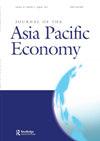Global Value Chains (GVCs) participation patterns and impacts on productivity growth in the Asian economies
IF 1.5
4区 经济学
Q3 ECONOMICS
引用次数: 1
Abstract
Abstract The paper examines the dynamic impact of GVCs on productivity growth in 14 Asian economies, from 1995 to 2016. OECD and Asia Productivity Organisation data show that in the last few decades there has been a rapid expansion of GVCs in the majority of the Asian economies. We employ the panel Auto-regressive Distributed Lag method to empirically evaluate the impact of GVCs participation on ‘total factor productivity growth’ and ‘labor productivity growth’. The empirical results point to the significant effect of GVCs on domestic productivity growth in the long run in the selected Asian economies, while the effect on labor productivity growth is larger than that on total factor productivity growth. However, GVCs does not affect it in the short-run. If excluded the six high-income economies and only focused on the middle-income countries, we find forward GVCs promotes domestic productivity in long run, while the backward GVCs does not.全球价值链参与模式及其对亚洲经济体生产率增长的影响
摘要本文考察了1995 - 2016年全球价值链对14个亚洲经济体生产率增长的动态影响。经合组织和亚洲生产力组织的数据显示,在过去几十年里,全球价值链在大多数亚洲经济体中迅速扩张。我们采用面板自回归分布滞后方法,实证评估了全球价值链参与对“全要素生产率增长”和“劳动生产率增长”的影响。实证结果表明,在所选的亚洲经济体中,全球价值链对国内生产率增长的长期影响显著,但对劳动生产率增长的影响大于对全要素生产率增长的影响。然而,全球价值链在短期内不会对其产生影响。如果排除6个高收入经济体,只关注中等收入国家,我们发现,从长期来看,向前的全球价值链对国内生产率有促进作用,而向后的全球价值链对国内生产率没有促进作用。
本文章由计算机程序翻译,如有差异,请以英文原文为准。
求助全文
约1分钟内获得全文
求助全文
来源期刊

Journal of the Asia Pacific Economy
ECONOMICS-
CiteScore
3.70
自引率
7.10%
发文量
58
期刊介绍:
Journal of the Asia Pacific Economy (JAPE) is concerned primarily with the developing economies within Pacific Asia and South Asia. It aims to promote greater understanding of the complex factors that have influenced and continue to shape the transformation of the diverse economies in this region. Studies on developed countries will be considered only if they have implications for the developing countries in the region. The journal''s editorial policy is to maintain a sound balance between theoretical and empirical studies. JAPE publishes research papers in economics but also welcomes papers that deal with economic issues using a multi-disciplinary approach. Submissions may range from overviews spanning the region or parts of it, to papers with a detailed focus on particular issues facing individual countries. JAPE has a broad readership, which makes papers concerned with narrow and detailed technical matters inappropriate for inclusion. In addition, papers should not be simply one more application of a formal model or statistical technique used elsewhere. Authors should note that discussion of results must make sense intuitively, and relate to the institutional and historical context of the geographic area analyzed. We particularly ask authors to spell out the practical policy implications of their findings for governments and business. In addition to articles, JAPE publishes short notes, comments and book reviews. From time to time, it also publishes special issues on matters of great importance to economies in the Asia Pacific area.
 求助内容:
求助内容: 应助结果提醒方式:
应助结果提醒方式:


